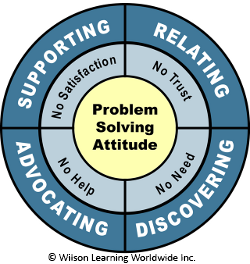The Consultative Process
As organizations strive to address their clients’ critical business issues, technical professionals play an important role in creating and implementing solutions for external and internal clients. While they are experts in their areas, many technical professionals are not equipped to handle the business side of a project. They need consultative problem-solving skills to create value for clients, and they need to integrate their technical skills into a consultative process. When they are able to do this, the technical professional becomes a real source of competitive advantage.
The Consultative Process (TCP) introduces a problem-solving mindset and presents an effective process for consulting with both internal and external clients. It helps technical professionals become comfortable in their role as consultants. It also helps them generate greater alignment and commitment with clients by using a win-win problem-solving approach. TCP examines a business relationship from the client’s viewpoint and addresses the four NOs that restrain the client from willingly engaging in the recommended solution, service, or product.
Knowing how to effectively address each of the four NOs means the difference between a successful relationship and an ineffective interaction.
Program Outcomes
The Consultative Process establishes a basic philosophy of consulting with a common and easily understood approach. Implemented as a flexible and integrated human performance improvement solution, it enables a consistent client experience from technical professionals, effective coaching and performance management with a variety of tools, and overall increased effectiveness.
Learning Approach
Wilson Learning believes that learning must be transferred to day-to-day work practices. To achieve this, TCP includes components and activities that enhance Participant Readiness, Learning Transfer, and Organizational Alignment.
Participant Readiness prepares salespeople and managers for the overall learning experience:
- Pre-workshop communication
Learning Transfer design embeds practice and use of new skills. The learning is delivered as a two-day face-to-face, application-oriented workshop.
TCP has five integrated learning modules, as shown on the following page. TCP can be delivered in modular format over non-consecutive days to allow application between sessions. The program can be taught by a Wilson Learning facilitator or by an organization’s own leader-trained in-house professional.
Organizational Alignment ensures the organization supports the use of the new skills:
- Post-learning reinforcement activities available for both the manager and participant
As a result, The Consultative Process becomes part of your organization’s selling practices, benefitting customers and increasing productivity.
Enabling Improved Performance
Driving behavior and performance change requires constant reinforcement. It’s for this reason that organizations that use TCP can access optional application, reinforcement, and support tools. These additional learning components—application exercises, job aid cards, planners, etc.—can be customized to ensure that technical professionals can continue to enhance their newly acquired skills and behaviors upon returning to work. Involving managers early on and training them to coach for improved performance is also fundamental to a successful TCP implementation.
To discover how we ensure learning is reinforced and applied for improved performance, see our Learning Transfer Approach.
Evaluation
Wilson Learning will partner with your organization to measure the initial behavioral changes and business results. We will work with you to set up evaluation systems that help improve outcomes and sustain the momentum of your implementation.
To learn more about measuring the impact of learning, visit Measurement and Evaluation Services.
This offering, like all others from Wilson Learning, can be customized to reflect your environment and business priorities and can be integrated with your processes.



 Please complete this form to download the factsheet for The Consultative Process.
Please complete this form to download the factsheet for The Consultative Process.



